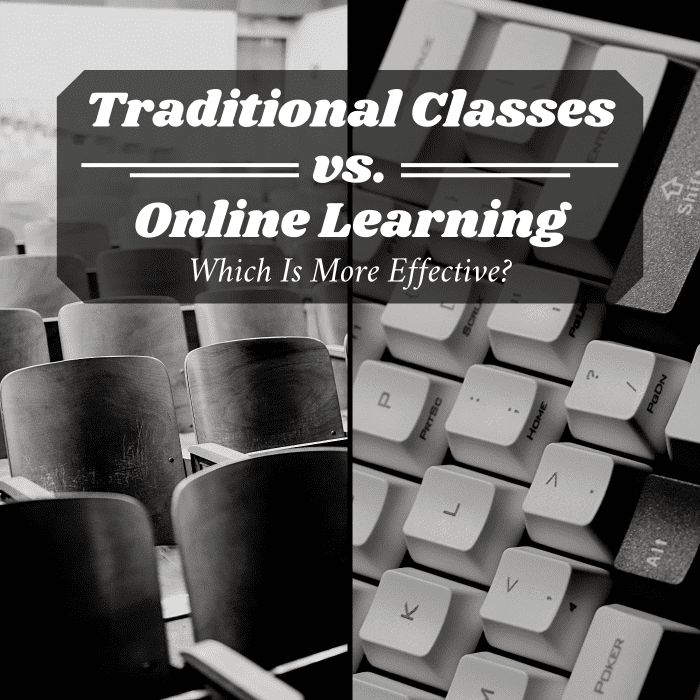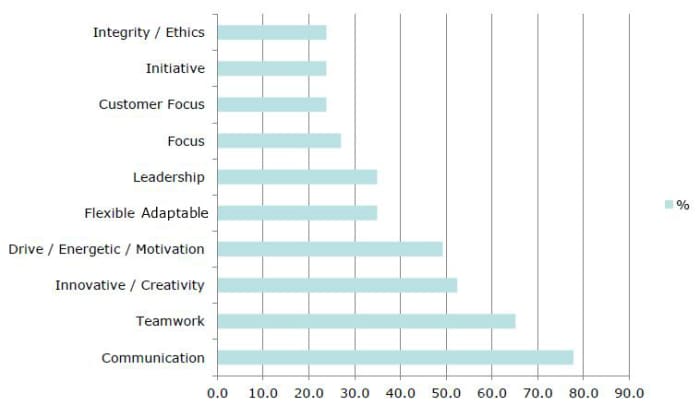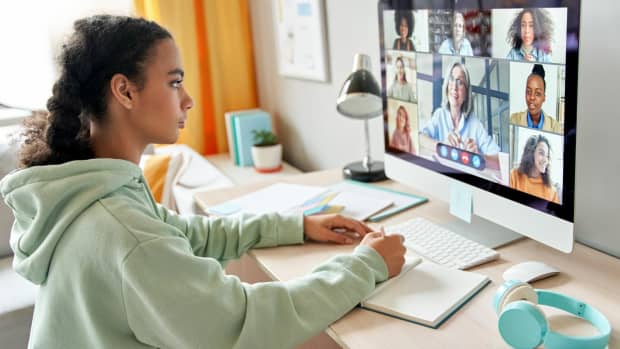Why Traditional Classroom Learning Is Better Than Online Courses
The Popularity of Online Courses
As more of what we do on a day-to-day basis moves to the web, online courses are exploding in popularity. The ability to relax at home and use our own personal computers to obtain college credits (oftentimes for a lower cost than in-person courses) is compelling more and more students to ditch the classroom and pursue an education online.
Technological progress has obviously made our lives easier and more efficient. With that said, it only seems fitting that we should move toward utilizing online learning in our colleges and universities ... or should we?
While it may seem appropriate to adapt our learning style to keep up with the technology available to us, there are reasons to believe that online courses are not nearly as beneficial to us as traditional-style classroom learning.
In this article, we'll examine the three main reasons why online courses aren't as advantageous for students as face-to-face classroom experiences.
Why Online Education Is Less Effective Than In-Person Learning
- Lack of Interpersonal Skill Development
- Lack of Memory Development
- Lack of Student Motivation

Taking online courses is convenient and can save you money, but are they as valuable as traditional, in-person classes?

Between public speaking, group projects, presentations, and relationships with professors, traditional education helps students build life skills while they acquire knowledge.
1. Lack of Interpersonal Skill Development
Online courses usually require little to no face-to-face interaction with classmates and teachers. Information about assignments is often posted online and may be completed at leisure without having to attend class meetings. While this convenience is nice, it lacks the interactive elements of traditional classrooms that help students develop crucial interpersonal skills for the future.
When in a classroom, students are often required to speak their minds. They may be required to give presentations or speeches. They have to work cooperatively in groups of people with differing viewpoints. Online courses require none of that.
Businesses often tell university faculty that they wish that graduating students had better interpersonal skills. They say it is crucial to their success in their careers. Traditional-style learning teaches these things.
Obviously, if businesses are telling universities they wish these skills were more evident, there is room for improvement even within traditional educational curricula. Still, online courses are not the answer. If anything, online courses will only hinder a student's ability to speak and interact with others in a way that will help them in their life and career.
When students are required to interact with classmates and professors, they gain confidence in their ability to speak to and collaborate. This grants them the opportunity to learn how to carry themselves in a professional manner. Because online learning doesn't provide practical experience working and communicating with others, its value to students is significantly lower.

The in-person assessments used in traditional classrooms incentivize students to retain the information they are learning rather than simply reference it for assignments.
2. Lack of Memory Development
Why do so many students sign up for online courses? Well, one reason is that they do not have to attend an actual class and can learn at home. A more serious and often unspoken reason may be the fact that online learning does not require students to study or memorize material in the same way that traditional learning does.
Students taking a test or quiz online do not have to worry about a professor catching them cheating. Students have the ability to use a book or quickly look up answers online during assessments. While many online tests are timed, and many professors don't mind the use of a book, is this really the way a student should learn?
Recommended
When someone does not have to study and memorize material, it does not embed in their long-term memory the same way it does when they need to retain what they have studied for a closed-book, in-person test.
This is a serious flaw with online courses; they do not promote memory development. Students may not realize it while enrolled in a difficult course, but they will better appreciate the education they receive if they are required to put more effort into obtaining it. A child does not learn how to spell by looking up words in a dictionary; they learn to spell by memorizing words over time through writing practice. This is what enables them to actually learn.

Traditional education provides a sense of community and motivates students to learn—not to simply seek a degree.
3. Lack of Student Motivation
One problem with online classes is that all too often, they motivate us to get a degree but not to learn. Having debates and in-class discussions with professors and peers who all have unique personalities motivates students to develop their own opinions and build the confidence to voice them. If a student is scared to voice their opinion, the classroom is the perfect place to practice and overcome that fear.
When students receive face-to-face verbal feedback and constructive criticism from their professors, it instills in them a motivation to improve their work and build upon what they've learned. Educational relationships and bonds give in-person learning an advantage over online learning.
Motivation is a skill that cannot be developed when students are allowed to complete tasks at their own leisure. They may get the work done, but it does not teach them how to complete a challenging task under the pressure of time.
In their future careers, students will need to complete tasks as they are assigned during specific windows of time. If a professor assigns a paper at the beginning of class and requires it to be handed in at the end of class, students have to work with what they have and perform under pressure. This mirrors the way tasks often work in real-life situations. Online assignments with far-off due dates that can be completed whenever students feel up to it do not provide the same sort of preparation.

What do employers look for in graduates? Teamwork and communication skills.
(gradireland.wordpress.com)
Make the Smarter Choice
There are some things that need to remain the same as time goes on and society continues to evolve. Education is one of them. While there is an argument that online learning allows people to learn at their own pace, it is still not as valuable as education obtained from a traditional style classroom.
Keep in mind, however, that this is only true if teachers and professors are good at what they do and students are willing to learn. If not, then education may be ineffective regardless of the method. For many, it just does not make sense to pay for online education when you gain more skill sets and knowledge with traditional style learning.
Many people cannot attend regular class meetings and therefore must utilize online learning. This is the case much of the time with graduate degrees. That is another story and is understandable. But for the person who is able to choose online or traditional education courses, the decision should be clear.
In the end, every student must ask themself, "Am I going to college to develop life skills and learn, or am I going to college to get a diploma?"
Related Articles
- 6 Things to Check Before You Pay for an Online Course
Be sure to check these six crucial elements before you pay for an online class. - The Benefits of Online vs. Traditional Education
Is teaching online good for students? Is it worse than traditional education? Explore the pros and cons of online education and the traditional classroom setting.
Comments
Alex rider on August 05, 2020:
Bro are you for or against online classes is not sure, and this i really need in my essay, everything else is great
Fabio Venson on August 04, 2020:
Imagine going to a university during this pandemic and you have to pay $2000-$3000/ credit hour for an online class. Big Unlucky LOL
Feranmi Falobi on July 24, 2020:
I prefer traditional class because of socialization and self motivation
Cherry on June 20, 2020:
I prefer the traditional classes to the online classes because of the tediousness of the class
Reuben Abraham Jacob on June 07, 2020:
I definately prefer traditional classes over the online since i totly miss my friends and also miss that close relationship with my teacher.
in traditional classes we are more socially engaged and that feels different than popping up on the couch and browse the media
James Ekeng on May 22, 2020:
Awsome
kyle bailey on May 19, 2020:
hmm nice i love traditional learning and the knowledge gets stuck in your head better then online learning but not everybody thinks its best.
Hector on May 14, 2020:
@Haya Hamidadinn get Grammarly
ky on May 13, 2020:
with covid 19 we are doing oline shcool work and somthimes its hard to foucus and i feel like I get lost a lot of the time, I would rather be in a classroom with a pencil ready to learn credits to the teatchers though for put up stuff for us to do.
Ruhi on May 12, 2020:
Your essay helped a lot!! Thanks! I have to have an oral defense, talking about how I am against online schooling and that traditional is better. Your essay helped a lot...
Ranjan Singh from patna on May 12, 2020:
I understand that you are right on your views but the reality is e-learning is growing with leaps and bounds. Here is some insights about it https://www.marketdecipher.com/report/e-learning-m...
Sean McMinn on May 08, 2020:
this helped me alot on my upcoming test. my teacher put up websites that i really under stand. but this helped me out alot. ( and sorry for my mistakes)
Abril Espino on April 23, 2020:
This is a really good website and it really helped me a lot by not using my phone while I do my assignments that are overdue and I learned my lesson, Just because I have a phone, It doesn't mean that I have to use it while I do my assignments that are overdue.
Anonymous on April 23, 2020:
I have a debate and i chose the side of virtual school. I used this article to find out what I am up against.
✰Niภjα✰ on April 11, 2020:
I like this article because it help me a lot! :D
Haya Hamidaddin on April 11, 2020:
I have an assignment due in a couple of days its an argument about online vs traditional school. My claim was that I believe traditional school is better, I kept searching but almost every article I read ended up with the fact that online school is better, I was divested and I was about to give up and change my whole claim, but then I came across your essay and god it might just be the best thing I've read about this topic. You don't know how thankful I am I seriously love this so much I might've just wrote the best essay I've ever written all because of you. Oh one last thing did I mention thank you :) (sorry for any mistakes in the comment I'm just in the 7th grade)
Chloe jackson on April 09, 2020:
I have to do an essay and yours just helped me some mach mater in fact it is the best essay I have ever read I am in 5th grade and my mom said you can go to traditional school because of your essay and that made me the happiest person standing
Chloe on April 09, 2020:
This is the best essay I have read and when I was reading your essay that gave me a lot of things for my essay I have to do for school sen's a sickness is going around and I am getting homeschooled right know.
Malak on November 15, 2019:
thanks a lot, it was helpful and it really helps me to write my argumentative essay plus there are three reasons that I can provide thanks again
Sethughes (author) on August 02, 2019:
Shivangi khanna
https://owlcation.com/academia/Why-Traditional-Cla...
Shivangi khanna on August 02, 2019:
I am having a question
Explain why traditional aducation is better online education
Sethughes (author) on July 29, 2019:
Thank you anonymous. This indeed is an opinion piece, my opinion. And is only supported through my own experiences and my own interpretation of various articles regarding what employers look for in employees. Thanks for your comments.
Anonymous on July 29, 2019:
I found this article to be extremely bias and provide very little evaluation of the differences between online and traditional colleges. As someone who has attended both, I can tell you that daily regular conversation with your class mates and professors, is much more prevalent when you are taking a class online than with a traditional lecture hall where you may see your professor... but will likely never actually speak with them. In addition, there are claims here that seem completely baseless. For example, "If a professor assigns a paper at the start of class and requires it be handed in at the end, that is good preparation for a career. Reading about a similar assignment online that is due in six days doesn't teach this." this statement is lacking of any evidence or any real logic.
In the example, the author is trying to compare a real-world situation where an employer may provide a deadline and a project, and then expect it to be completed. Stating that a teacher in person, providing a similar function, vrs an online professor doing the same thing does not teach or prepare a student for this type of situation seems to be a stretch.
There is also no evidence provided to support the idea that online college is more costly, especially with accredited programs being offered by some colleges in part, or in entireity for free online. Nationally accredited programs such as at uofpeople and khan university which can provide continuing education and full degrees for students at vastly lower than traditional tuition rates.
It is quite obvious as a reader with experience with both methods of college, that the author here has only ever had one (if any) experiences in college. The single experience of one student, does not in any way provide a tangible or objective perspective on the possible pros and cons of online learning.
In fact, the evidence provided for the necessity for interpersonal and communication skills, seems to suggest that online learning would actually be more valuable in this sense. This is because it challenges students to find ways around communication barriers, and helps train them for tackling long distance communication which is extremely important and common in large corporations and multi-national companies.
In short, this article feels like an opinion piece, developed from an opinion with no backup or research involved.
Anonymous College Student -
Azr on May 22, 2019:
I hate traditional education. I have no motivation and some teachers are so boring! I prefer the Khan Academy style, it is much more interesting than the traditional courses! But I am right with the idea it is not very personal, but some traditional courses are not more personal! So we should mix both! And take care of the comprehension and motivation of every student. In the best world...
Divyasharma on April 26, 2018:
Interpersonal communication is an exchange of information between two or more people. It is also an area of study and research that seeks to understand how humans use verbal and nonverbal cues to accomplish a number of personal and relational goals.
Nimra Ahmad on February 17, 2018:
I think classroom education has its own charm and build the character of students that online can not build
leo on October 31, 2017:
ur the best sethughes
DMD on September 21, 2017:
Can any one tell me
How to introduce these topic in GD.
Emma on May 16, 2017:
found this article very helpful, My teacher said it was well written and helpful. @sethughes, is a great writer and should make hi own website,(hint,hint ;}) ;Anyway, point being, I found this webdite VERY helpful.
SEal on May 03, 2017:
cool.
Iris on March 13, 2017:
Both sides have their own advantages and disadvantages. Just remember, not all people are fit for traditional classroom setting. For some people, online class is the best method. As for me, I can finish a textbook in a day or two and concentrate more on topics that I need to learn more. In a physical classroom, you are expected to catch up with everyone.
Cheating in exams always happen in a physical classroom also. There are students who pay their professor to get a passing grade. There are also biased grading done by professors due to favoritism.
Online learning is the most upfront learning. It suits people who are too busy, introverts/socially inept, & have special needs. You don't have to pay for extravagant miscellaneous fee and tackle subjects you don't even need. Don't forget that a physical school is also a business.
Amanda from Michigan on March 18, 2015:
Your article shows a lot of bias with favoritism towards traditional classroom settings. This would be fine, except your argument is only based on assumptions. I think it would be important remember that a student determines his or her own success by choosing whether or not they want to apply themselves to their coursework. Online learning has many advantages, as does traditional learning. Personal learning styles and intelligence strengths also factor in. To say with black-and-white certainty that traditional classwork is the "smartest option" reflects how one-sided your article is. Having said that, I do agree with you that critical thinking is very important when it comes to education. One thing to consider is that critical thinking comes from questions and conversation, something which a good professor should be able to do online or in the class room. Very interesting hub, thanks for sharing.
Your hub was so inspirational that I decided to write a hub in response to your topic.
Nadine from ohio on November 25, 2014:
I am a traditional student and have always taken classes on campus, in classrooms. This is the first semester I have taken an online class and I believe that online classes do not teach students anything. I do not even study for my online class, nor did I really learn anything this semester. I am getting an A in the class too, yet I know nothing? It is easy to do well when taking online classes, but you really do not learn anything.
I this many points in this hub were very correct! thank you for sharing.
Leslie Bank on August 14, 2014:
There's a difference between online classes and online programs. I've taken online classes at my local community colleges and am enrolled in an online bachelor of science program at a university. For the B.S. program they require us to go to testing centers for exams while most of my online community college classes did not require this, so I suggest you revise your article to include this. I think it is ridiculous how many people assume that just because a class or degree program is online that everyone in cheats their way through. As well, the majority of people in my online B.S. program are extremely motivated, much more so than those pursuing the same degree at my local university "traditionally." Those in the traditional program are generally younger, not working, and have few responsibilities while those in my online program are juggling school, work, children, and more. For your comment about memorizing, my online program is very much about application of the subject matter. I've been in many more classes "traditionally" that required memorization and I believe this factor varies by teacher preference and class requirements and is not dependent on whether or not the class is online. For my online statistics class I still have to memorize the same formulas as "traditional" students and take my exams on campus.
Nitesh on April 10, 2014:
Tradition classrooms are best but online education is also best if we join private coaching of important topics of course. I think course syllabus does more matter for any course. I have completed my higher secondary school course in distance e-learning and also joined tuition for some important topics according to my choice. Online education is more flexible than regular and traditional courses. Also I had prepared well for my IIT JEE Main Exam and expected to get good result at http://delhi.indiaresults.com/jee-2014/
mbuggieh on July 31, 2013:
I strongly disagree with the notion that online courses do not foster the development of inter-personal skills. In fact, online courses exceed the requirements and expectations of inter-personal skills development and exercise of the traditional lecture. Try participating in an online discussion without inter-personal and net-etiquette skills and see what happens. It is not "pretty".
In addition, lack of motivation is a student problem and not a function of the medium through which the course is delivered.
As for cheating or lack of development of "memory" and learning skills: There are many mechanisms in place to catch cheaters. I use them effectively in all of my courses. And, learning is NOT about memorizing. Assessments properly designed and managed for the online course environment do not and should not focus on memorization, but on learning---meaningful learning.
Katarina Radford from Southern United States on April 10, 2013:
I have enjoyed reading your hub. As an online instructor, I totally agree with your article. However, I like to think that I am helping to educate non-traditional students who don't have any other options to further their education. If given a choice, traditional learning is definitely best.
msmkhana from New Delhi on March 20, 2013:
I totally agreed with you. Traditional class where we learn the way of developing skills and solve real-time project while online courses help us to gain theoretical knowledge. I wouldn't suggest the online course if you are student.
Cristina Cakes from Virginia on January 21, 2013:
This is a great hub with valid information and points. I have attended college both online and in the traditional classroom. Personally for me, online just works better. My work schedule wouldn't allow me time to take classes so I could study in my own time and even during my down time at my job.
I was very nervous about not interacting with other students because I agree that is an important part of learning. Luckily, the school I chose does make it part of a grade requirement to participate in online discussions with the instructor and rest of the class. I also worried about the open book exams, however once I started taking my exams I realized that the questions were formatted in such a way that even though I had the book open in front of me, I really had to know and understand the material to get the question correct.
While I enjoyed the college atmosphere as a younger student and even miss it now, I do have to admit that my grades were much higher in the online classroom. I think that in large is due to the fact that it was easier to focus on my studies when social activities were not also on my mind.
All that being said, I think that for a younger student out of high school, a traditional college is a good choice. I believe that going to a University and being on your own is a good way to learn responsibilities of the real world. For someone a bit older with a full time job and kids, like me, online just fits better into that lifestyle.
I really enjoyed reading your material, I think your views can really help somebody who is trying to make the decision about which type of school to attend!
rss.k-12.blendedlearning on January 14, 2013:
I think that blended learning is the best way to go. It combines traditional classroom learning with online learning and it makes for a great education system!
Richard Mankiewicz on December 05, 2012:
I studied (and taught a bit) at the Open University in the UK. This started as a home-based learning university for working adults, with paper materials and live tutorials. It has now expanded to online materials and live tutorials... with the added benefit of student-student interactions online, previously not possible unless you swapped phone numbers.
For a teacher, giving the same lectures year in year out is very boring. Put the video lectures online and spend that saved time in tutorials with real student participation.
pinkhawk from Pearl of the Orient on December 02, 2012:
I think it really depends upon the person and the situation... Both approach could be more effective. ^_^!
Janis Goad on December 01, 2012:
Hi Sethughes, I enjoyed your article. I am currently taking a course with Coursera, and am really enjoying it. You make some good points about young learners needing to develop social skills in presenting their ideas publicly and engaging in debate and conversation.
For older learners, like me, who have developed those skills through life experience and the working world, online courses are wonderful.
I linked to your article in my own hub, Review of a MOOC Massive Open Online Course with Coursera.
Missy Mac from Illinois on September 26, 2012:
Great article. You are correct, online learning does not require a student to memorize facts as in a traditional college. Depending on the online university, students have opportunities to participate in collaborative projects, but student location will determine meetings. Thanks again.
Frank Slovenec from San Francisco, CA on September 25, 2012:
Very well said. The more senses that can be impacted by a subject, the greater the learning On-line without an instructor will affect possible sight and heating, the live interaction is lost or subdued. In subduing this interaction the learning becomes less. You are right online for completing the check boxes for a degree will provide dramatically less learning. I believe a combination of on-line and personal / group interaction will make both more valuable and improve the learning experience. Well done.
SisPeter on July 31, 2012:
This was a great piece. Valuable points. In response to ChristinS who said that she is able to do her assignments at her own convenience, I believe classroom is much better in that regard as you would have gotten use to meeting deadlines as required in the work place.
Sethughes (author) on July 10, 2012:
Marcela, I think in your situation it is probably better to take online courses. When we have immense responsibilities it is usually makes things run smoother. You seem to be an exception to many in that you believe in truly obtaining an education and not just a degree. English is an especially important area to ensure you truly do learn. I think if at all possible, it is better for younger students to take traditional classes as you also suggest.
Thanks for reading and for your comments.
Marcela Arnaut on July 10, 2012:
You make valid points here. I'm married, have two girls, and a part-time job with no family around to help me so I feel my best option is on-line. I'm on my way to obtaining my BA in English on-line. I do agree that on-line education makes it easier for many people to make it through simply to obtain a degree more than a real education but as many here have said, it also depends on the student. I'm a perfectionist and I tend to study more than required. I'm the type of student who if allowed to use an open book for a test I would rather do the test closed book and risk getting a lower grade knowing that's what I deserved. I also research and read other material beside the material provided by the institution. On-line schools do use the method of writing many essays and research papers to prove learned knowledge as well. In on-line schools, if you really want to learn you have to take matters into your own hands, so it does take more discipline and drive. No one will be pushing you to advance. Pretty much you reap what you sow. Nevertheless, when my daughters grow up I will encourage them to go in person to a traditional school. I think that as you implied, being around people face to face is very important for our social skills and to prepare us for the work force, so for younger or single people I would recommend going physically to school. I’m glad that the on-line option is available for people in my position though. Interesting and informative hub!
Sethughes (author) on July 09, 2012:
Thanks for the comment and the great points! I wrote this hub based on my own experiences and experiences from those I have known that took online courses.
I suppose this is an issue that also may come down to the individual professor and his or her own requirements. Some classes that take place in a room may be less educational if the professor is sub par at what he does.
Im sure upper level classes are more demanding as you have pointed out. I am nearing the end of my undergraduate degree and so have not yet experienced that. I am glad to know those that take online classes for PhD's are getting a good education and are required to earn it.
Thank you again for reading and for the commentary.
Dr Billy Kidd from Sydney, Australia on July 09, 2012:
You make a great case for classroom learning, Seth. There's a lot more going one here. Most accredited universities give timed tests. The open book part doesn't much help if you've only got 30 minutes.
There's also the issue of how people learn. Some people learn best while interacting within a classroom. Other peoople learn best when they can read the lecture notes at the beginning of the week, and then dig into the online reseach, using dozens of scholarly journals.
Many colleges require the entire class to interact online, along with the professor, in an ongoing 24/7 12-week discussion session. Part of the grade is one's participation. There's group projects too.
Still, all your points are valid for some people and some schools. (try a PhD level course is psychoneuroimmunology, like I did. That took about 4 hours a day, 5 days a week!)
Hope things work on the job maket for you.
Sethughes (author) on June 29, 2012:
I think it is great you had the ambition to stay enrolled and not take time off when your priorities shifted. Your own education will be important to loved ones as well. Writing is another subject that can be done just as well online as it can in the classroom. I do think if you have a good teacher who is inspirational, it helps to be in a classroom. Still, if you have the motivation (it seems you do) to truly learn and better yourself, you will do just that no matter how it is done. I think any sort of education is better than no education and I admire your motivation and ambition in pursuing yours. Thank you for sharing.
Jami Johnson from Somewhere amongst the trees in Vermont. on June 29, 2012:
I agree with this hub completely, and always prefer to take classes in the classroom. It is more effective in learning and obtaining the information when it comes to discussion, debate, and lecture. With that said, I am very thankful for on-line classes, without them I would not have graduated with my associates degree after my baby was born. After my daughter was born my full priorties shifted, but my education was still and is very important to me. Online classes helped me to proceed in college without taking time off and still being able to stay home full time with a small child. I also think on-line classes are useful for independent study and learning. I took my creative writing classes on-line, and without doing that, I don't know if I would have felt comfortable enough in my writing and computer skills to join hubpages. I believe my on-line creative writing class was more effective than the one I took in the classroom, but I'm not exactly sure why (even though both were very, very good learning experiences, and I wouldn't be where I am today in my writing if I had neglected to take both of them). Very good article/hub.
Sethughes (author) on June 29, 2012:
Thank you, and I understand your points. It kind of depends on someones own personal situation. You live a ways away. That is understandable.
The focus on the younger students is really what I was thinking of here. If you feel you have developed these skills already and enjoy the subjects enough, I think online is perfectly fine. Still, many people (especially freshman and sophomores) will tell themselves they don't need the skills learned from a traditional classroom. They are only hurting themselves.
Thanks, good points.
Christin Sander from Midwest on June 29, 2012:
I have taken both types of classes and I have to tell you I prefer the online courses. Of course, I am motivated to learn because I enjoy my subjects. I also like the convenience of doing work when it's convenient for me and in my experience anyway, I found the instructors tend to make the online courses more challenging. I can see your point for younger students especially, about gaining social skills and life skills by attending an actual class. For me, the campus is 45 minutes away and I have more important ways I can use all that driving time :) - Voted up and interesting, definitely some points to consider that you brought up here.
Sethughes (author) on June 28, 2012:
Understandable! Many people don't. Thank you very much!
beingwell from Bangkok on June 28, 2012:
I would go for this if I really don't have the time! Great hub!
HL Keeley from Charlotte, NC on June 28, 2012:
I hate online classes. I forget when I have work due. I dropped that class quickly.
Sethughes (author) on June 28, 2012:
Thanks for the comment. I think you're right about online being ok for certain subjects like math. It may actually benefit some people if they are truly doing their best to learn. Good point. There are some subjects that don't require much interaction or discussion. Hopefully if we do transition into nothing but online learning one day, it will be in a way that teaches the skills we need that can't currently be taught online.
Lizam1 on June 28, 2012:
I would hate to think that all learning will be done online one day. Howerver I think for certain subjects it can really help students. My daughter is taking math online and out of high school because math is a challenge and online - with visits to the tutor available at the homeschool program is more successful. I have also started counselling online and am pleasantly encouraged by the comfort of the face to face via Skype - www.lizamilesonline.com. Good hub and thought provoking. thanks.
Sethughes (author) on June 28, 2012:
It seems to me the problem usually lies with the user as you said. If people were truly motivated to learn, they could get better results from online courses. Although, they would still be missing out on some things. Still, even if a classroom, a student wont learn if he is not engaged in the class and discussion. But yes I agree online courses are good for those with full time jobs or with the inability to attend physical classes.
Jbern117 from Dunmore, PA on June 28, 2012:
Very interesting, nice to hear the other side of the argument - it seems to me everyone is pushing for online courses such as those offered by udacity and coursera, but I definitely agree with you (having taken some of these online courses) that it has it's downfalls...but it also seems to me that those downfalls primarily are found in the user, not the system itself... If you really want to learn and can't for whatever reason (financially or physically) online courses can be a great asset. Nothing beats a classroom and hands on learning though!








